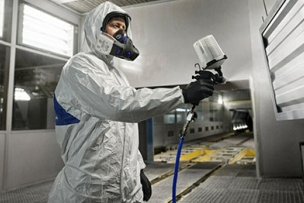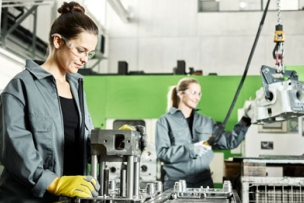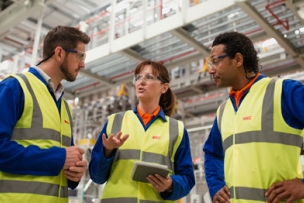Narrator: This video is brought to you by SHOWA. Always innovating, never imitating. If you're looking for real world insights, tips from leading industry experts, the latest trends in products and technology, you've come to the right place. From MSC Industrial Supply, this is Tooling Up.
TONI NEARY: Hello and thank you for joining us here on Tooling Up. I'm your host, Toni Neary. I'm so happy that you're here with us today on the MSC YouTube channel. If you're new, don't forget to click subscribe so you don't miss any upcoming episodes. And I'm so excited to have a special guest here with us today, Brian Moseley. Brian is the RA/QA Technical Manager at SHOWA Group.
And I'm thrilled because word on the street is Brian is the global expert on biodegradable nitrile. Brian, thank you so much for joining us today.
BRIAN MOSELEY: Toni, it's a pleasure to be with you today and I look forward to our interview and explaining what we do here at SHOWA and how we benefit the environment.
TONI NEARY: Well, before we get all gloved up, tell us a little bit about yourself and how you ended up at SHOWA.
BRIAN MOSELEY: It's quite a deep history. This coming May in 2024, I will have been with SHOWA for 20 years. I have backgrounds in chemistry and chemical engineering and actually started at SHOWA in the maintenance department within the production processes and then worked through college and ended up with a position in research and development. SHOWA is a very strong company for innovation and when I saw that as I was working internships and through college with them, it was fascinating and very interesting to me.
And that's how I started with SHOWA because it was just I could tell we could change the world just through gloves. And you can, as you can tell, for 20 years, I enjoy every single day that I'm here.
TONI NEARY: And I love that. And I love the fact that your company has been family owned for over 70 years, right?
BRIAN MOSELEY: That is correct. It was started by a gentleman in Japan, Akeo Tanaka, who was also very innovative at heart, making the first PVC glove. And that started everything from the polymer side in helping end users to protect themselves and be more efficient in their workplaces.
TONI NEARY: Now, one of the things that we always want to talk about is promoting sustainability. And I, for one, am a huge fan of acronyms. So we're going to talk about EBT today and that is Eco Best Technology. Now, I have to say, when we talked this really blew my mind. Tell me what EBT is and what's the difference between this and some of the other nitrile gloves on the market?
BRIAN MOSELEY: What happened for years, SHOWA and other companies were making nitrile gloves by the billions every year, but back in around 2011, 2012 SHOWA started looking at it from a different perspective, but we looked at it from the waste side in what's happening to the environment. What kind of pressure and burden are we putting on the environment when we dispose of all these?
It's great that we're protecting the end user, but we need to go a little step further because the environment is part of what we live in. We must be sustainable, in harmony with the environment, and not just being a burden on it in waste, but being able to take these products and put them within a system, the environment.
And that's where EBT was thought of and went through the research and development process. So SHOWA brought about EBT. And what does EBT do? EBT allows the nitrile to, once it enters into this type of landfill environment, to start breaking down because the nitriles are made up of, like I said, carbons and hydrogens and those types of atoms, same type of atoms that a banana peel and several other things that we dispose of daily go into.
So the microbes now see the glove as essentially food and something that they can break down. And once that glove enters into the landfill, the microbe doesn't look at it as an inert object, but it sees it as something it can utilize. And that's where the microbes start attacking the glove, breaking it down. And at that point, the glove becomes a part of the environment and within harmony of the carbon cycle and not a burden that's very inert that will sit around for decades and decades.
TONI NEARY: And so proactive. I mean, this is not anything that was done by a mandate or anything else. They proactively did this. And this is the part that blew my mind. When was the EBT introduced?
BRIAN MOSELEY: In 2012 is when it was introduced. And one of the things that I can say is it was our desire to be one with the consumer, a great partner with our end users and a partner with the environment as well.
TONI NEARY: Absolutely amazing. And can you share a little bit of data with us on the time it takes to break down and what that looks like? Because I know this is a very diligent process. You've gone through so much research. Tell us a little bit about the difference in the breakdown of the EBT versus a standard nitrile glove.
BRIAN MOSELEY: Yes, as I said before, a standard nitrile glove is going to stay in the landfill for decades, some even say 100 years. And, and the EBT, we have so many testing data from ASTM, which is an international agency that provides standards and protocols for all types of testing. And we have data that shows up to 80%, 82%, 83% in 365 days on a nitrile glove with EBT which is far superior than that one that's going to be there for decades.
TONI NEARY: And the fact that you did that with no drop off in performance in the EBT gloves is really mind blowing. And I think that really speaks to SHOWA as an organization and how you really do want to fit into that harmony with your universe around you as well.
BRIAN MOSELEY: It does. It's very important because we have two things that we think we must look after, and that is our end users. We want them to go home every day to their families, knowing that they were protected by a SHOWA product in their end use because they're there working for their families. So it's so very important that we do not have a product that is inferior.
So like I said before, that was one of our first goals. But then we want to go home at the end of the day knowing we did what's right for the environment because we protect the end user that day, but that in user’s children, we're protecting what they're going to inherit a generation or two later, which is the environment.
And we feel like we have a definite commitment to both of those entities.
TONI NEARY: Brian, I cannot thank you enough for your time today. It has been an absolute pleasure meeting you and hearing all of this work that's happening just as the fiber of who SHOWA is.
BRIAN MOSELEY: Toni it's been my pleasure. Thank you very much.
TONI NEARY: It was so great speaking with Brian today. And if you've enjoyed our conversation as much as I did, make sure to click that subscribe button so you don't miss any upcoming episodes. To find out more about these amazing high-performance gloves that make sustainability easy, go to www.mscdirect.com/showa. Thanks so much and we'll see you next time on Tooling Up.
Narrator: Want more insights and ideas to improve the efficiency and productivity of your operations? Check out the Tooling Up video playlist to hear tips that can take your company to the next level. And subscribe to our channel so you won't miss out.




Talk to Us!
Leave a reply
Your email address will not be published. Required fields are marked *